Uber has admitted to and accepted responsibility for concealing a 2016 data breach which affected 57 million users and 600,000 drivers.
The ride-hailing giant’s admission to the US Federal Trade Commission (FTC) comes as part of a non-prosecution agreement signed with the FTC to resolve an investigation which ran from 2015 to 2017 into Uber’s data security practices.
According to the agreed facts, the hackers responsible for the breach used stolen credentials to access a private source code repository and obtain a private access key. From there, the hackers used the key to access and copy large quantities of data associated with Uber’s users and drivers.
The 2016 breach was not reported to the FTC until around a year later, when new executive leadership was managing the company.
When they learnt of the breach, the new leadership team investigated and disclosed the news to affected drivers, the public, law enforcement, and foreign and domestic regulators, including state attorneys general and the FTC.
The FTC agreement also notes that Uber settled civil litigation with the attorneys general for all 50 States and the District of Columbia related to the 2016 data breach, paying $148 million and agreeing to implement measures including a corporate integrity programme, specific data security safeguards, and incident response and data breach notification plans, along with biennial assessments.
The agreement also notes that Uber has invested substantial resources to significantly restructure and enhance the company’s compliance, legal, and security functions.
Latest News
-
Amazon says drone strikes hit Middle East data centres
-
Europe's ‘first’ payment made by AI agent conducted by Santander
-
OpenAI seals Pentagon AI deal with safety guardrails hours after Anthropic ban
-
Cybercrime increases in sophistication as hackers age, according to new research
-
Vodafone and Amazon team up to improve rural mobile connectivity in Europe and Africa
-
Researchers challenge Big Tech with specialist AI for financial forecasting
The future-ready CFO: Driving strategic growth and innovation
This National Technology News webinar sponsored by Sage will explore how CFOs can leverage their unique blend of financial acumen, technological savvy, and strategic mindset to foster cross-functional collaboration and shape overall company direction. Attendees will gain insights into breaking down operational silos, aligning goals across departments like IT, operations, HR, and marketing, and utilising technology to enable real-time data sharing and visibility.
The corporate roadmap to payment excellence: Keeping pace with emerging trends to maximise growth opportunities
In today's rapidly evolving finance and accounting landscape, one of the biggest challenges organisations face is attracting and retaining top talent. As automation and AI revolutionise the profession, finance teams require new skillsets centred on analysis, collaboration, and strategic thinking to drive sustainable competitive advantage.
© 2019 Perspective Publishing Privacy & Cookies


.jpg)







Recent Stories